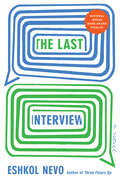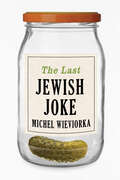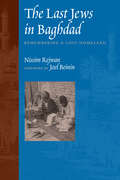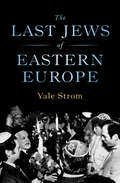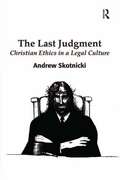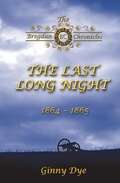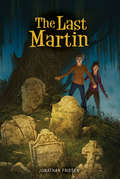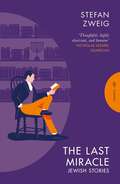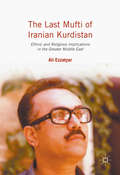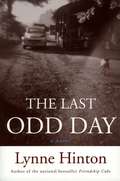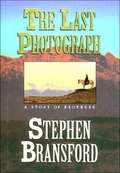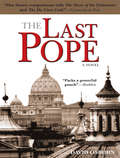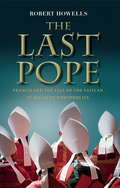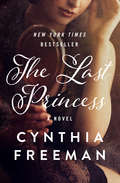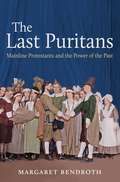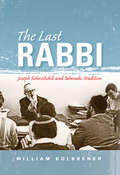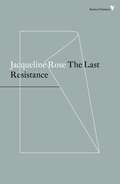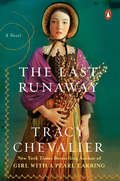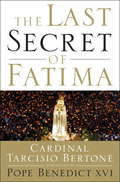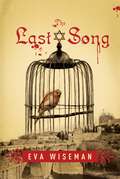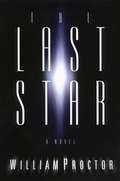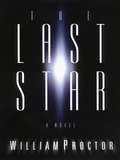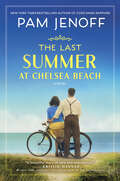- Table View
- List View
The Last Interview: A Novel
by Eshkol NevoFrom the internationally best-selling author of Three Floors Up, a literary page-turner that delves into the deepening cracks in a carefully constructed public persona. A writer tries to answer a set of interview questions sent to him by a website editor. At first, they stick to the standard fare: Did you always know you would be a writer? How autobiographical are your books? Have you written any stories you would never publish? Usually his answers in these situations are measured, calculated, cautious. But this time, when his heart is about to break and his life is about to crumble, he finds he cannot tell anything but the truth. The naked, funny, sad, scandalous, politically incorrect truth.Every question the writer tackles opens a door to a hidden room of his life. And each of his answers reveals that at the heart of every truth, there is a lie—and vice versa. Surprising, bold, intimate, and utterly engrossing, The Last Interview shows just how tenuous the lines are between work and life, love and hate, fact and fiction. And in exploring the many, often contradictory facets of an Israeli author&’s identity, Eshkol Nevo also gives us a nuanced, thought-provoking portrait of a country at odds with itself.
The Last Jewish Joke
by Michel WieviorkaThe golden age of Jewish humour flourished in the second half of the twentieth century, enjoyed by Jews and non-Jews alike, but its twilight years are now in sight. Telling jokes has the potential to reaffirm community once religion, political loyalties and victimhood are stripped away: from the 1960s on, a unique cultural dynamism bound up in these jokes reminded Jews around the world of what it means to be Jewish. Often, jokes pit one group against another, but Jewish jokes opted for self-deprecation instead, and in this case, laughing at the group reinforced it. They enabled Jews to live in harmony with others in full conscience of their differences and they safeguarded a desire for survival at the heart of Jewish identity. Moreover, absurd, larger-than-life characters such as Rabbi Jacob generated tolerance, empathy and tenderness among non-Jews after the horror and guilt of the Shoah. From the early 2000s, however, the space that allowed Jewish jokes to flourish began to shrink, due to a decline in the understanding of the Shoah, a less positive image of Israel and a waning of the importance of Jewish culture in American intellectual and cultural life. This playful and personal book by Michel Wieviorka includes Jewish jokes but also laments the disappearance of the Jewish joke and eulogises its ability to allow the thriving of community alongside difference. It is an original and wide-ranging analysis of the evolution of the diaspora and its relationship with the State of Israel, its history and dramas as well as its cultural creativity.
The Last Jews in Baghdad: Remembering a Lost Homeland
by Nissim Rejwan foreword by Joel BeininOnce upon a time, Baghdad was home to a flourishing Jewish community. More than a third of the city's people were Jews, and Jewish customs and holidays helped set the pattern of Baghdad's cultural and commercial life. On the city's streets and in the bazaars, Jews, Muslims, and Christians-all native-born Iraqis-intermingled, speaking virtually the same colloquial Arabic and sharing a common sense of national identity. And then, almost overnight it seemed, the state of Israel was born, and lines were drawn between Jews and Arabs. Over the next couple of years, nearly the entire Jewish population of Baghdad fled their Iraqi homeland, never to return. In this beautifully written memoir, Nissim Rejwan recalls the lost Jewish community of Baghdad, in which he was a child and young man from the 1920s through 1951. He paints a minutely detailed picture of growing up in a barely middle-class family, dealing with a motley assortment of neighbors and landlords, struggling through the local schools, and finally discovering the pleasures of self-education and sexual awakening. Rejwan intertwines his personal story with the story of the cultural renaissance that was flowering in Baghdad during the years of his young manhood, describing how his work as a bookshop manager and a staff writer for the Iraq Times brought him friendships with many of the country's leading intellectual and literary figures. He rounds off his story by remembering how the political and cultural upheavals that accompanied the founding of Israel, as well as broad hints sent back by the first arrivals in the new state, left him with a deep ambivalence as he bid a last farewell to a homeland that had become hostile to its native Jews.
The Last Jews of Eastern Europe
by Yale StromIn striking photography and informative text, this volume both celebrates and mourns Eastern European Jewish life of the early- to mid-twentieth century.From Odessa to Budapest, Warsaw, Prague, and Sarajevo, the Jews of Eastern Europe established thriving, traditional communities . And while there are still proud Jews who keep the Kehilla robust in the region, they are a shadow of their former glory. In The Last Jews of Eastern Europe, Yale Strom and photographer Brian Blue record a way of life that largely disappeared through the torment, violence, and upheaval of the twentieth century. Through the USSR, Poland, Czechoslovakia, Hungary, Romania, Yugoslavia, and Bulgaria, this volume records the three great blows to Eastern European Jewry: the historical persecution of the Jews who suffered the envy of their neighbors; the slaughter of millions during World War II; and the loss of those who accepted the aliyah to Israel. It also records how the Jews of Eastern Europe laugh, weep, and sing.
The Last Judgment: Christian Ethics in a Legal Culture
by Andrew SkotnickiIn a culture obsessed with law, judgment, and violence, this book challenges Christians to remember that Jesus urged his followers to judge no one, bring harm upon no one, and follow no law save the law of altruistic love. It traces Christian history first to show that Christians of an earlier age took very seriously the gospel injunctions against punitive legal judgment and then how the advent of formal legal codes and philosophical dualism undermined that perspective to create a division between a private Christian spirituality and a public morality of order and legally sanctioned violence. This historical approach is accompanied by an argument that the recovery of a Christian ethic based upon unconditional love and forgiveness cannot be accomplished without the renewal of a Christian spirituality that mirrors the contemplative spirituality of Jesus.
The Last Long Night (The Bregdan Chronicles #5)
by Ginny DyeCan they survive the Last, Long Night of the Civil War? The power of the Union army brings the South to its knees in surrender, but not until a year of intense pain and violence creates a chasm that may be impossible for the country to bridge. Carrie struggles to hold on to hope as the world caves in around her, hanging on to the promise she’s been given. She also finally gets to reveal the secret she has held so close. Moses is gravely wounded in battle. Aunt Abby faces danger as she gets more deeply involved with women’s rights, and spends time in Washington, D.C. Robert’s plantation takes a severe loss, but is saved from burning by an unlikely source. Rose continues to thrive in the Contraband Camp and finally has a dream come true.
The Last Martin
by Jonathan FriesenThirteen year-old Martin Boyle, the most fearful hypochondriac born into a family of worriers, doesn’t want to visit the family cemetery. Truth is, none of the Boyles are thrilled about the annual trip to visit their war dead. It shames Mr. Boyle to think of his once courageous family line, and Mrs. Boyle is certain the greenish moss growing on the headstones carries disease. But after strict no-touch warnings from Mrs. Boyle (and an anti-bacterial scrub down), Martin ventures into the private cemetery for a grim remembrance. He’s surrounded by stones that bear his name. Martin, the Boyle family name, has been given to the firstborn male in each Boyle household for centuries. While his father offers a speech honoring Martins who have gone before, Martin wanders among his ancestors. Writing on the old headstones is hardly legible, and he scratches at birth and death dates with a stick. His analytical mind gravitates toward the numbers, and his stomach sinks. The pattern is clear: Martin 1770-1819. Martin 1819-1835. Martin 1835-1899. Martin 1899-1956. Martin 1956-1996. There’s always a Martin. Only one Martin. Martin panics. Not because he was born in 1996—that only fits—but because his uncle and aunt are expecting their first child, a boy, in three months. Tradition dictates they will name him Martin. He’s seen the graveyard. He has proof of the curse. When the next Martin is born, he’ll die. Martin’s parents believe the cemetery pattern is a coincidence, and a sign that their son needs professional help. It’s a belief that’s about to get stronger because their son, with the help of a homeless boy named Poole, is about to make his first decision of consequence: with twelve weeks until the baby’s arrival and no time to waste, Martin chooses to live. Little does he know that the key to his survival—the cornerstone of the curse—lies embedded
The Last Miracle: Jewish Stories (Pushkin Press Classics)
by Stefan ZweigA unique collection of stories—presented together here for the first time—from one of the great voices of the European Jewish diasporaThis collection from one of the great pre-war writers, himself a member of Europe&’s Jewish diaspora, highlights the precarious position that Jewish people have occupied throughout millennia, in stories that move across centuries and nations but show the unchanging pressure of outsider status. But these stories are about individuals, too—in Zweig&’s treatment, the particular passions of particular hearts will always blaze out brightly against the levelling forces of history.In &‘Mendel the Bibliophile&’, a bookseller&’s obsession with his wares blinds him to the progress of war and the threat it poses to his own life. Monomania is also an overpowering force in &‘Downfall of the Heart&’, in which an aging father cannot accept his daughter&’s embrace of new freedoms. &‘The Miracles of Life&’ is a masterfully ironic tale, which plays with the tension between faith and morality, society and individual, against the backdrop of 1500s Antwerp and the Dutch rebellion against Spanish rule. &‘In the Snow&’ sees a Jewish community in medieval Eastern Europe fleeing the violence of a Christian sect. And in the longest piece in the collection, the novella The Buried Candelabrum, we go all the way back to the ancient world, where the recovery of a sacred seven-branched candlestick stolen during the sack of Rome will become a young Jewish boy&’s life&’s mission.
The Last Mufti of Iranian Kurdistan
by Ali EzzatyarAmidst changing notions of religion and identity in the modern Middle East, this book uncovers the hidden story of Ahmad Moftizadeh, the nonviolent religious leader of Iran's Kurds during the Iranian Revolution. The characters of Ayatollah Khomeini and a number of other prominent revolutionaries surface through never before heard first-hand accounts of that era's events. The author further surveys the underlying causes of conflict and extremism today by placing this dramatic biography in the context of a rapidly-evolving region after the First World War. The author's coverage of some of the twentieth century Middle East's most defining events leads him to powerful policy arguments for a region in turmoil.
The Last Odd Day
by Lynne HintonFrom the Bestselling Author of Friendship Cake Comes a Remarkable Story of Love, Loss, Infidelity, and Forgiveness
The Last Ottomans
by Kevin Featherstone Dimitris Papadimitriou Argyris MamarelisA new study of the international and local politics surrounding the Muslim minority of Western Thrace (Greece) in the 1940s, based on previously unseen archival material. Addresses the minority's complex identity, its relations with other communities in the area, the international diplomacy of WWII and strategic considerations of the Cold War.
The Last Photograph: A Story of Brothers
by Stephen BransfordThe Last Photograph will sweep you into the lives of two brothers coming of age in the American West of the 1960s. This is the story of the firstborn, Gordon, a tough and rebellious cowboy who loses his youth in Vietnam; of his brother Stephen, who reaches across the gulf between them after the war; and their unique father Griz, a rigid lumberjack- preacher who finally becomes their spiritual brother in a gripping and unforgettable climax. Here is a classic tale, dealing with rites of passage, shattering loss, and a whispered voice that completes the "unfinished business" between brothers. When a family hunting trip in the Idaho wilderness is proposed, Stephen hears a small voice in his heart telling him to restrain his competitive instincts and really look at his brother. As a writer and photographer, Stephen brings his unique gifts on the trail ride.
The Last Pope
by David OsbornIn the tradition of the classic bestseller The Shoes of the Fisherman, this evocative and moving novel takes you deep inside the inner world of the Vatican and the American branch of the Holy See to dramatize the great moral issues dividing the Church. The passing of humble and beloved Pope Gregory XVIII brings the Lords of the Church to the Basilica of St. Peter in Rome to meet in its secret recesses and elect a new pope. They find they must choose between a caring, but guilt-ridden, American cardinal (the very same young priest who made a heart-rending confession so many years ago) who would bring reforms to the Church, or a cardinal whose soul belongs to the Inquisition. At stake is the future of the Church itself.
The Last Pope
by Robert HowellsNearly a thousand years ago the Archbishop of Armagh, later canonised as St Malachy, made a series of prophecies that were hidden in the Vatican for 400 years. His predictions gave clues to the identities of the 109 Popes from medieval times to present day, including the final Pope who would oversee the end of the Papacy and the fall of the Roman Catholic Church. The Last Pope examines the sudden 'rediscovery' of these prophecies in the 16th century and how they may have been used as propaganda in the campaign to promote Pope Gregory XIV to the papal throne. The book also explores the claim that the prophecies are forgeries. Ultimately, they stand or fall by their accuracy (after the time of their rediscovery), and there are many examples where, even in recent years, they have proven to be entirely correct. With Pope Benedict XVI we may have reached the penultimate Pope. According to the prophecies of St Malachy, the next Pope will be the last. In the final prophecy, St Malachy describes the last Pope as 'Peter the Roman'. By deduction, Robert Howells has identified which Cardinals are likely to be present at the next Vatican Conclave to choose a successor to Pope Benedict XVI.A favourite among them is a candidate who can readily be identified as 'Peter the Roman'. If he comes to power he may yet prove Malachy right, and oversee the fall of Rome and the destruction of the Catholic Church.
The Last Princess: A Novel
by Cynthia FreemanThe New York Times–bestselling novel of a forbidden 1920s romance between a rebellious society woman and a Jewish writer from the author of No Time for Tears. In this evocative around-the-world tale of star-crossed love, Cynthia Freeman—the beloved author celebrated for her deft storytelling and understanding of family dynamics—takes readers on a whirlwind romance from Manhattan to Hollywood to the Israeli desert. Beautiful and well-bred, the daughter of a wealthy businessman, Lily Goodhue is a woman who, on the surface, has everything. Her impending marriage to the handsome scion of a distinguished New York family was to be the wedding of the decade. People called it a match made in heaven. Yet beneath the dazzling façade, she is haunted by a devastating childhood tragedy and a deep yearning for true love, for someone who will want her simply for who she is. It all appears to Lily one day, like the sun emerging from behind the clouds, when she meets Harry Kohle, an aspiring young writer and the son of a banker. Enthralled and blinded by love, Lily breaks off her engagement, runs off with Harry, and never looks back, dedicating herself to a love against all odds. Their act of passion will leave them both disinherited, facing the challenge of living a marriage day by day, through thick and thin, as the glittering Prohibition era gives way to the crushing years of the Great Depression and beyond. It is a love that will prove to be Lily&’s greatest trial—and triumph. With the same &“heartfelt, almost inspirational prose&” that made No Time for Tears an unforgettable read, The Last Princess is a ravishing, complex love story and a moving testament to the human spirit&’s ability to overcome life&’s sorrows (The New York Times Book Review).
The Last Puritans
by Margaret BendrothCongregationalists, the oldest group of American Protestants, are the heirs of New England's first founders. While they were key characters in the story of early American history, from Plymouth Rock and the founding of Harvard and Yale to the Revolutionary War, their luster and numbers have faded. But Margaret Bendroth's critical history of Congregationalism over the past two centuries reveals how the denomination is essential for understanding mainline Protestantism in the making. Bendroth chronicles how the New England Puritans, known for their moral and doctrinal rigor, came to be the antecedents of the United Church of Christ, one of the most liberal of all Protestant denominations today. The demands of competition in the American religious marketplace spurred Congregationalists, Bendroth argues, to face their distinctive history. By engaging deeply with their denomination's storied past, they recast their modern identity. The soul-searching took diverse forms--from letter writing and eloquent sermonizing to Pilgrim-celebrating Thanksgiving pageants--as Congregationalists renegotiated old obligations to their seventeenth-century spiritual ancestors. The result was a modern piety that stood a respectful but ironic distance from the past and made a crucial contribution to the American ethos of religious tolerance.
The Last Rabbi: Joseph Soloveitchik and Talmudic Tradition
by William KolbrenerJoseph Soloveitchik (1903-1993) was a major American Orthodox rabbi, Talmudist, philosopher, and theologian. In this new work, William Kolbrener takes on the Soloveitchik's controversial legacy and shows how he was torn between the traditionalist demands of his European ancestors and the trajectory of his own radical and often pluralist philosophy. A portrait of this self-professed "lonely man of faith" reveals him to be a reluctant modern who responds to the catastrophic trauma of personal and historical loss by underwriting an idiosyncratic, highly conservative conception of law that is distinct from his Talmudic predecessors, and also paves the way for a return to tradition that hinges on the ethical embrace of multiplicity. As Kolbrener melds these contradictions, he presents Soloveitchik as a good deal more complicated and conflicted than others have suggested. The Last Rabbi affords new perspective on the thought of this major Jewish philosopher and his ideas on the nature of religious authority, knowledge, and pluralism.
The Last Resistance
by Jacqueline RoseA bravura exploration of politics and writing in dark times In The Last Resistance, Jacqueline Rose explores the power of writing to create and transform our political lives. In particular, she examines the role of literature in the Zionist imagination: here, literature is presented as a unique form of dissidence, with the power to expose the unconscious of nations, and often proposing radical alternatives to their dominant pathways and beliefs. While Israel–Palestine is the repeated focus, The Last Resistance also turns to post-apartheid South Africa, to American national fantasy post-9/11, and to key moments for the understanding of Jewish culture and memory. Rose also underscores the importance of psychoanalysis, both historically in relation to the unfolding of world events, and as a tool of political understanding. Examining topics ranging from David Grossman, through W.G. Sebald, Freud, Nadine Gordimer, the concept of evil, and suicide bombers, The Last Resistance offers a unique way of responding to the crises of the times.
The Last Runaway: A Novel
by Tracy ChevalierNew York Times bestselling author of Girl With a Pearl Earring and At the Edge of the Orchard Tracy Chevalier makes her first fictional foray into the American past in The Last Runaway, bringing to life the Underground Railroad and illuminating the principles, passions and realities that fueled this extraordinary freedom movement. Honor Bright, a modest English Quaker, moves to Ohio in 1850--only to find herself alienated and alone in a strange land. Sick from the moment she leaves England, and fleeing personal disappointment, she is forced by family tragedy to rely on strangers in a harsh, unfamiliar landscape. Nineteenth-century America is practical, precarious, and unsentimental, and scarred by the continuing injustice of slavery. In her new home Honor discovers that principles count for little, even within a religious community meant to be committed to human equality. However, Honor is drawn into the clandestine activities of the Underground Railroad, a network helping runaway slaves escape to freedom, where she befriends two surprising women who embody the remarkable power of defiance. Eventually she must decide if she too can act on what she believes in, whatever the personal costs.From the Trade Paperback edition.
The Last Secret of Fatima: My Conversations with Sister Lucia
by Giuseppe De Carli Tarcisio BertoneWith an introduction by Pope Benedict XVI and including information previously suppressed, the Vatican's Secretary of State, Cardinal Bertone, definitively reveals and explains one of the most controversial events in twentieth-century Catholicism--the 1917 apparition of the Virgin Mary at Fatima. During World War I, three Portuguese children received a vision in which Mary, the Mother of Jesus, foretold great global turmoil. The first part of their vision--warnings about World War II, communism, and the spread of atheism--were widely publicized, but Vatican officials were hesitant to reveal the vision's concluding images, thus creating the "secret" of Fatima. Speculation about this secret gripped many Catholics, and the aura of intrigue surrounding Fatima grew when the Church hierarchy barred the last surviving visionary from speaking publicly. InTHE LAST SECRET OF FATIMA,Cardinal Bertone, the Vatican equivalent of prime minister and a top advisor to Pope Benedict, breaks the Vatican's official silence on the last secret. Rather than Armageddon, he claims, the final prophecy envisaged the 1981 assassination attempt on Pope John Paul II. Bertone argues the apparition at Fatima was a call to renewal for the Church, and he was assigned the task of promulgating this message by the Pope.
The Last Sin Eater
by Francine RiversFrom book jacket... "The first time I. saw the sin eater was the night Granny Forbes was carried to her grave." Cadi Forbes knows it's forbidden, that it will bring curses down on her. But something deep and instinctive moves her to look upon the sin eater anyway. And now the thought of finding him again consumes her. According to custom, only the sin eater can set her free from the sin that plagues her days and nights, the sin that has stolen her mother's love from her. ... Must she carry her guilt forever? Or is there Another who will atone for her? A skillful blend of realistic characters, historical accuracy, and compelling mystery, The Last Sin Eater is a story that will move the heart and the spirit. "Rivers delivers both a powerful message about Christian beliefs and the need for forgiveness of sins and an evocative portrayal of life in the 1850s." - Library Journal
The Last Song
by Eva WisemanSpain had been one of the world's most tolerant societies for eight hundred years, but that way of life was wiped out by the Inquisition. Isabel's family feels safe from the terrors, torture, and burnings. After all, her father is a respected physician in the court of Ferdinand and Isabella. Isabel was raised as a Catholic and doesn't know that her family's Jewish roots may be a death sentence. When her father is arrested by Torquemada, the Grand Inquisitor, she makes a desperate plan to save his life - and her own. Once again, master storyteller Eva Wiseman brings history to life in this riveting and tragic novel.From the Hardcover edition.
The Last Star
by William ProctorIs it the latest in spy technology, a meteor, a UFO, or a new star? No one-not even government leaders, military commanders, astronomers, or other scientists-can provide any real answers regarding the mysterious light that has suddenly appeared in the eastern sky. When a diverse group of scholars and scientists meets in Israel to investigate the phenomenon, they are soon caught in a web of political and spiritual intrigue, terrorist bombings, and sniper attacks. As uncertainty about the phenomenon causes worldwide panic, the pressure is turned up to find a scientific answer to the mystery of the light. But the team is determined to convince the world of its findings-that the light is the return of the Star of Bethlehem, which signals Christ's Second Coming.
The Last Star
by William ProctorIs it the latest in spy technology, a meteor, a UFO, or a new star? No one-not even government leaders, military commanders, astronomers, or other scientists-can provide any real answers regarding the mysterious light that has suddenly appeared in the eastern sky. When a diverse group of scholars and scientists meets in Israel to investigate the phenomenon, they are soon caught in a web of political and spiritual intrigue, terrorist bombings, and sniper attacks. As uncertainty about the phenomenon causes worldwide panic, the pressure is turned up to find a scientific answer to the mystery of the light. But the team is determined to convince the world of its findings-that the light is the return of the Star of Bethlehem, which signals Christ's Second Coming.
The Last Summer at Chelsea Beach
by Pam JenoffFrom the New York Times bestselling author of The Orphan’s Tale comes an intoxicating novel of love and redemption during a time of war.Summer 1941. Young Adelia Montforte flees fascist Italy for America, where she is whisked away to the shore by her well-meaning aunt and uncle. Here, she meets and falls for Charlie Connally, the eldest of the four Irish-Catholic boys next door. But all hopes for a future together are soon throttled by the war and a tragedy that hits much closer to home. Grief-stricken, Addie flees—first to Washington and then to war-torn London—and finds a position at a prestigious newspaper, as well as a chance to redeem lost time, lost family…and lost love. But the past always nips at her heels, demanding to be reckoned with. And in a final, fateful choice, Addie discovers that the way home may be a path she never suspected.Originally published in 2015.
